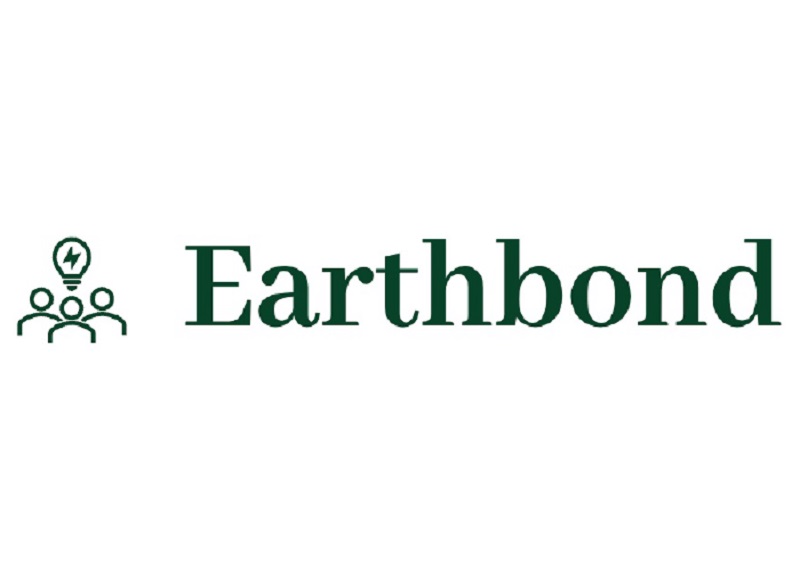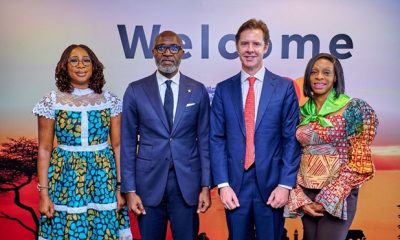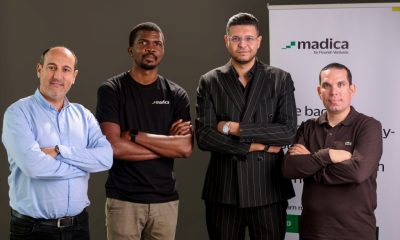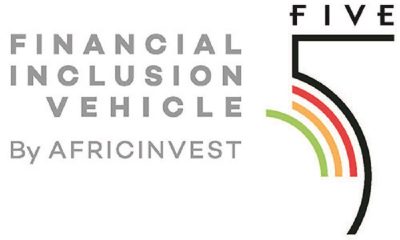Economy
Madica Invests in Earthbond to Simplify SMEs Access to Clean, Affordable Energy

By Adedapo Adesanya
Madica, a structured investment programme designed for pre-seed stage startups in Africa, has announced its investment in Earthbond, a climate tech startup unlocking affordable, reliable solar energy for Nigerian small and medium-scale enterprises (SMEs) via an integrated clean energy marketplace.
According to a statement, Earthbond will participate in Madica’s comprehensive investment programme which includes 18 months of dedicated company-building support.
Launched in 2022 and affiliated with Flourish Ventures, a global Fintech venture capital firm with purpose, Madica provides investment funding of up to $200,000 and delivers support to portfolio companies through a highly personalised startup curriculum, hands-on mentorship, and fully-funded week-long founder immersion trips.
Selected startups also stand to gain executive coaching opportunities, and access to Madica’s global network of investors for follow-on funding – all designed to spur growth and ensure the long-term viability of the startups.
Earthbond, founded in 2023 by Ms Chidalu Onyenso, an experienced product manager with an MBA degree from Harvard and more than 10 years in the field, is tackling Nigeria’s $14B off-grid generator market by leveraging group financing and carbon accounting to reduce costs and risks in the energy transition.
Between 2017 and 2023, Nigeria’s grid collapsed 46 times, forcing about 86 per cent of companies to rely on costly and polluting fossil-fuel generators, which cost businesses over $29 billion annually. Solar power offers a cheaper and more sustainable alternative, but high installation costs deter small and medium businesses (SMBs) from its adoption.
To address this challenge, Earthbond enables businesses to go solar through access to embedded solar finance and a marketplace of accredited solar installers and suppliers.
Earthbond said since its launch, it has completed audits for more than 100 qualified customers in Lagos, representing a potential pipeline of $1 million in solar projects. More than 1,800 Nigerian SMBs have also expressed interest by joining the waitlist, highlighting the gap and product-market fit.
The startup has established partnerships with four local commercial and microfinance banks to facilitate loans for SMEs seeking to transition to solar power.
With Madica’s investment, the company says it will help drive its ambitious growth by boosting its financing capacity, enabling $10 million in targeted loan originations over the next 3 years.
The funds will also enhance sales and marketing efforts and develop innovative maintenance and payment tools to enhance the customer experience.
Additionally, EarthBond plans to create a unique revenue stream by offering discounts based on carbon credits, incentivising businesses to join the programme.
Ms Onyenso, Earthbond CEO, said: “This is a pivotal moment for Earthbond, and a powerful endorsement of our mission. We’re really excited to be joining the Madica portfolio family. Leading the charge of energy transition is no easy feat and we are glad to be joined by renowned investors who share our passion and drive.
“We look forward to the doors this support opens and also to a greener and cleaner future,” she added.
On his part, Mr Emmanuel Adegboye, Head of Madica said, “We are excited to be investing in this exceptional startup as it tackles some of today’s biggest climate challenges. We won’t be able to continue the advancements of the African tech ecosystem without addressing power, and we are impressed by the team at Earthbond, their vision, and the technology that provides an affordable and eco-friendly solution. Earthbond has tremendous potential to drive an equitable clean energy future and positively impact our region.
“Investing in Earthbond reaffirms our mission to demonstrate that exceptional founders and products exist beyond the usual homogeneous groups, and we remain devoted in our quest to support underrepresented founders and fuel the growth of pioneering startups across underserved African regions.”
Economy
Stronger Taxpayer Confidence, Others Should Determine Tax Reform Success—Tegbe

By Modupe Gbadeyanka
The chairman of the National Tax Policy Implementation Committee (NTPIC), Mr Joseph Tegbe, has tasked the Nigeria Revenue Service (NRS) to measure the success of the new tax laws by higher voluntary compliance rates, lower administrative costs, fewer disputes, faster resolution cycles, and stronger taxpayer confidence.
Speaking at the 2026 Leadership Retreat of the agency, Mr Tegbe said, “Sustainable revenue performance is built on trust and efficiency, not enforcement intensity,” emphasising that the legitimacy and predictability of the system are more critical than punitive measures.
He underscored that the country’s tax reform journey is at a critical juncture where effective implementation will determine long-term fiscal outcomes.
The NTPIC chief stressed that tax policy must serve as an enabler of governance, and should embody simplicity, equity, predictability, and administrability at scale.
These principles, he explained, foster voluntary compliance, reduce operational friction, and strengthen investor confidence. He warned that ad-hoc adjustments or policy drift could undermine reform momentum, unsettle businesses, and deter investment, which thrives on predictable rules rather than shifting announcements. Structured sequencing, clear transition mechanisms, and continuous feedback between policymakers and administrators are therefore critical to sustaining reform credibility.
Mr Tegbe further argued that revenue reform cannot succeed in isolation. Achieving sustainable gains requires a whole-of-government approach, leveraging robust taxpayer identification systems, integrated financial data, efficient dispute resolution, and harmonised coordination across federal and sub-national levels. This approach, he said, reduces leakages, eliminates multiple taxation, and reinforces confidence in the system.
He noted that the passage of four new tax laws marks only the beginning of a broader reform agenda, describing the initiative as a systemic recalibration of Nigeria’s fiscal architecture, rather than a routine policy update.
He further asserted that the true measure of success will be the credibility of implementation, not the design of the laws themselves.
The NRS, he noted, functions as the nation’s “Revenue System Integrator,” with outcomes reflecting the strength of an interconnected ecosystem that encompasses policy clarity, enforcement consistency, digital infrastructure, dispute resolution efficiency, and intergovernmental coordination.
Economy
NUPENG Seeks Clarity on New Oil, Gas Executive Order

By Adedapo Adesanya
The National Union of Natural and Gas Workers (NUPENG) has expressed deep concern over the Executive Order by President Bola Tinubu mandating the Nigerian National Petroleum Company (NNPC) Limited to remit directly to the federation account.
In a statement signed by its president, Mr William Akporeha, over the weekend in Lagos, the union noted that the absence of detailed public engagement had naturally generated tension within the sector and heightened restiveness among workers, who are anxious to know how the new directive may affect their employment, welfare and job security, especially as it affects NNPC and other major operations in the oil and gas sector.
It pointed out that the industry remained the backbone of Nigeria’s economy, contributing significantly to national revenue, foreign exchange earnings, and employment.
The NUPENG president affirmed that any policy shift, particularly one introduced through an Executive Order, has far-reaching consequences for regulatory frameworks, Investment decisions, operational standards, and labour relations within the sector.
According to him, “there is an urgent need for clarity on the scope and objectives of the Executive Order -What precise reforms or adjustments does it introduce? “Its implications for the Petroleum Industry Act -Does the Order amend, interpret, or expand existing provisions under PIA?
“Impact on workers and existing labour agreements-Will it affect job security, conditions of service, Collective Bargaining agreements or ongoing restructuring processes within the industry? “Effects on indigenous participation and local content development -How will it affect Nigerian companies and employment opportunities for citizens?”
He warned that without proper consultation and explanation, misinterpretations of the Executive Order may spread across the industry, potentially destabilising operations and undermining industrial harmony that stakeholders have worked hard to sustain.
“Though our union remains committed to constructive engagement, national development and stability of the oil and gas sector, however, we are duty-bound and constitutionally bound to protect the rights and welfare and job security of our members whose livelihoods depend on a clear, fair and predictable policy framework,” Mr Akporeha further stated.
Economy
Uzoka-Anite Warns Against Inflation Risks from Oil, Gas Earnings Surge

By Adedapo Adesanya
The Minister of State for Finance and chairman of the Federation Account Allocation Committee (FAAC), Mrs Doris Uzoka-Anite, has cautioned that a projected surge in oil and gas revenues following President Bola Tinubu’s latest executive order could trigger inflationary pressures and exchange rate volatility if not carefully managed.
She said that the recent executive order mandating the direct remittance of certain oil sector revenues to the federation account would provide regulatory clarity and significantly strengthen revenues accruing to the federation account, but warned that sudden liquidity injections into the economy may complicate monetary policy coordination with the Central Bank of Nigeria and erode the real value of allocations to federal, state and local governments.
While addressing members of FAAC in Abuja, Mrs Uzoka-Anite commended President Tinubu on the order, describing the development as a structural fiscal correction aimed at restoring constitutional discipline to petroleum revenue management and enhancing distributable income across the three tiers of government.
She said that the revenue outlook was improving due to ongoing structural reforms introduced by the Federal Government.
According to her, the newly implemented tax reform measures are broadening the tax base, improving compliance and enhancing administrative efficiency.
“Also, the executive order signed by Mr President on February 13 is reinforcing revenue discipline in the oil and gas sector and reducing leakages,” she said.
The minister said that the order suspends the 30 per cent allocation to the Frontier Exploration Fund (FEF) and suspends the 30 per cent management fee on oil and gas profit payable to NNPC Limited.
She said that the order also directed that gas flare penalties be paid into the federation account, and mandated full remittance of petroleum revenues without unconstitutional deductions.
Mrs Uzoka-Anite said that the reform marks a shift from a retention-based oil revenue model to a gross remittance, federation-first model.
“The implications for FAAC are very significant; more oil and gas profit will now flow directly into the federation account.
“Gas flare penalties will become distributable revenue, and previously retained management fees will no longer reduce remittable inflows,” she said.
She said that the reforms were expected to result in higher monthly gross inflows into the federation account, and increased allocations to federal, state and local governments.
The minister said that a retrospective audit of the FFF, the Midstream and Downstream Gas Infrastructure, was due, and NNPC management fee deductions could lead to recoveries that may provide a one-off fiscal boost.
She welcomed the improved revenue outlook and cautioned against the risks associated with sudden liquidity injections.
“Experience shows that when revenues rise sharply and are distributed fully and immediately, large liquidity injections can increase inflationary pressures, complicate monetary management and reduce the real purchasing power of allocations,” she said.
She said that excess aggregate demand, exchange rate pressure, asset price distortions and inflationary risks could arise if increased inflows were not carefully managed.
Mrs Uzoka-Anite said that to mitigate such risks, she proposed phased disbursement of one-off recoveries.
She suggested that retrospective recoveries be staggered rather than injected into the economy in bulk, with a portion temporarily warehoused in a stabilisation buffer.
She also recommended strengthening the excess crude and stabilisation buffer mechanism to channel part of incremental inflows into a fiscal stabilisation window.
“This could offset revenue shortfalls in weaker months and reduce procyclicality in spending.
According to her, enhanced coordination with the CBN would be pursued to align fiscal injections with liquidity management tools and support open market operations where necessary.
Mrs Uzoka-Anite urged states and federal Ministries, Departments and Agencies (MDAs) to prioritise capital expenditure over recurrent expenditure.
She called for investment in infrastructure, agriculture, energy and other productive sectors, and avoid unsustainable wage or consumption spikes.
“Productive spending expands supply capacity and mitigates inflation,” she said.
She also announced plans to introduce monthly revenue transparency dashboards, production-to-remittance reconciliation reporting, and clear reporting of incremental inflows arising from tax reforms and the executive order.
The junior finance minister said that the reforms presented an opportunity to deepen fiscal federalism, enhance distributable revenue, restore constitutional clarity and strengthen trust among tiers of government.
She also advised that increased revenue must not translate into fiscal complacency.
“We must resist the temptation to treat incremental inflows as permanent windfalls. We should reduce debt burdens, clear arrears responsibly, build buffers and invest in growth-enhancing sectors,” she said.
-

 Feature/OPED6 years ago
Feature/OPED6 years agoDavos was Different this year
-
Travel/Tourism10 years ago
Lagos Seals Western Lodge Hotel In Ikorodu
-

 Showbiz3 years ago
Showbiz3 years agoEstranged Lover Releases Videos of Empress Njamah Bathing
-

 Banking8 years ago
Banking8 years agoSort Codes of GTBank Branches in Nigeria
-

 Economy3 years ago
Economy3 years agoSubsidy Removal: CNG at N130 Per Litre Cheaper Than Petrol—IPMAN
-

 Banking3 years ago
Banking3 years agoSort Codes of UBA Branches in Nigeria
-

 Banking3 years ago
Banking3 years agoFirst Bank Announces Planned Downtime
-

 Sports3 years ago
Sports3 years agoHighest Paid Nigerian Footballer – How Much Do Nigerian Footballers Earn























